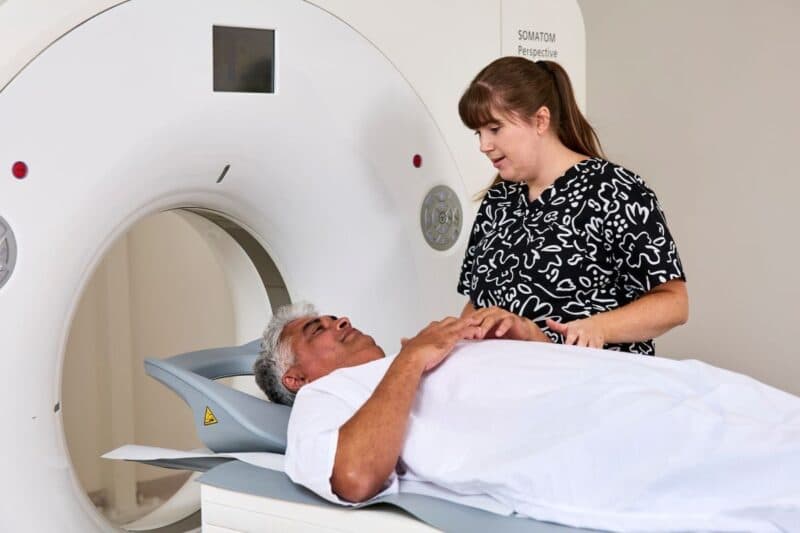How it works
Lung screening is free, quick and painless.

Lung screening involves a low-dose Computed Tomography (CT) scan to take images of your lungs to look for signs of lung cancer.
This page outlines the steps for lung screening and what you can expect.
Step 1: See your doctor or healthcare provider
They will ask you some questions about your age and smoking history to see if the program is for you.
If you are eligible, and want to have the scan, you will be given a low-dose CT request form to book your scan.
Step 2: Book your CT scan
You will need to book your scan in at a local radiology clinic and attend at the time they advise.
There are also mobile screening services available for people living in rural and remote areas.

Good to know
Your doctor’s clinic or health service may be able to help you identify local radiology clinics that offer free lung cancer screening. You can ask about this at your appointment.
Step 3: Go to your appointment
When you arrive at the clinic:
- you will be welcomed by a staff member, and they will explain what to expect
- you might need to fill out some paperwork and confirm your details
- you may be asked to complete a health check
- you will be asked if you can lift your arms above your head for 5 to 10 minutes
For the scan:
- a radiographer will take you to a private space for comfort
- you will be asked to lie flat on the bed with your arms above your head
- will need to hold your breath and lie still for a few seconds while the machine takes images of your lungs.
The scan is quick, painless and doesn’t involve any needles. The appointment will take around 10 to 15 minutes.

Good to know
Speak to your radiology clinic if you need any help to get on to the bed, or to keep still during the scan.
Step 4: Receive your results
After your scan, the radiologist (a doctor that examines x-ray and scan images) will look at your scan, upload your results to the National Cancer Screening Register (NCSR) and send them to your healthcare provider. Your healthcare provider will share the results with you, and the NCSR will remind you when it is time to screen again.
The next steps will depend on your scan results.
If nothing is found, you will need to come back for your next scan in 2 years. Having regular screening is the best way to find lung cancer early, when it’s easier to treat.
If something has been found, you will need to go back to your doctor to discuss your results. They will let you know the next steps, which might be another scan or to see a specialist for further testing.
It's normal to feel nervous about any cancer screening tests. Speak to your doctor or healthcare provider if you are feeling worried.
It is important to remember that the scan can sometimes find something that needs further investigation, but this does not mean you may have cancer. Sometimes the scan can show things either in the lungs (something other than cancer, such as emphysema), or outside of the lungs (such as heart disease).

Good to know
If you notice any symptoms or changes in your lungs, don’t wait for your next scan. See your doctor or healthcare provider so that they can check your lungs and see what may be causing the symptoms.
It's good to know: tips for your scan
Wear something comfortable
You may be asked to put on a medical gown for your scan. Wearing clothes that makes it easy for you to get changed is recommended.
You may also need to remove any metal jewellery you are wearing for the scan.
Ask for assistance if you need it
If you need help to have your scan or make it easier, let your radiology clinic know before your appointment. This could include asking:
- if an interpreter is available
- for a support person to be in the room with you
- for accessibility options at the clinic and during the scan (including assistance to get on the bed for the scan).
If you are feeling nervous about your scan or have questions, your health care providers are there to help and make sure you are comfortable.
You can bring a support person
It's normal to feel nervous about any health tests. You can bring a support person with you to your appointment to help you feel more relaxed.
There are resources and services that can support you through your screening process.